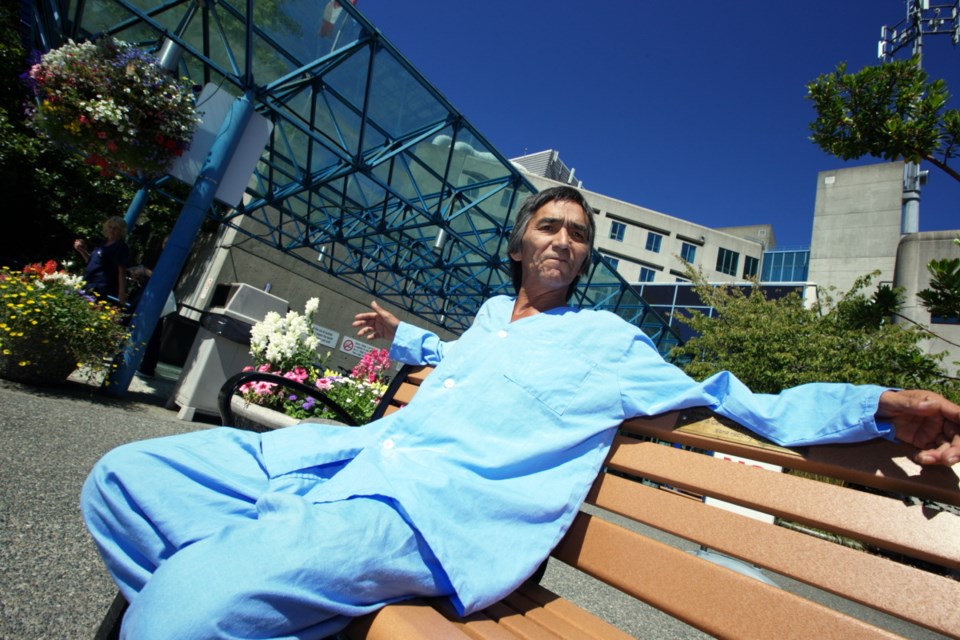A homeless Victoria man is being discharged from hospital post-surgery with nowhere to recover or sleep, other than a shelter mat or on the street.
“I’m going to be released but I have nowhere to go,” said Donald Peter Prevost at Victoria General Hospital Friday. He was scheduled to leave later in the day.
Prevost, 55, had gallbladder surgery on Monday. He has auto-immune pancreatitis, severe arthritis and a shoulder injury, he said.
About 10 years ago he was slammed by a building stud. He’d been a carpenter for 20 years, he said, and worked for Kinetic Construction and on buildings such as Hillside Centre and the Delta Ocean Pointe Resort.
He now lives on $312 a month from workers compensation and has been trying for nearly a year to get social assistance or long-term disability.
“I keep getting told to apply for this or send that but get turned away. I really don’t know what to do,” said Prevost, who does not want to give up his only source of income in order to see if he then qualifies for assistance programs.
Bernice Kamano, an aboriginal outreach worker, said she was contacted by a nurse at the hospital worried about Prevost, a member of the Namgis First Nation from Alert Bay.
“The concern was he’s going to be released with nowhere else to go,” said Kamano, who works with the Aboriginal Coalition to End Homelessness. “When I first spoke to him he was literally weeping.”
Kamano called around to shelters and non-profit service providers.
“The best they could do was a mat on the floor or a cot... But that’s only at night. He’d have to leave and walk around from 6 a.m. to 9 p.m. How are you supposed to heal like that?” Kamano asked.
She said this is a common problem among homeless people in the city. A month ago she was called to help a homeless man in his late 30s who was being discharged after a stroke.
“He was in the hospital for two months and still needs speech therapy but he’s out there, still on the street,” she said. “He struggles to even talk.”
She said another person had a seizure on the street, was on life support and not expected to make it.
“But he did and is back on the streets,” she said. “I am heartbroken, angry, frustrated at what is going on here.”
Kamano said at least 10 homeless aboriginals have died this year in Victoria, all prematurely and with multiple health issues. “You’re lucky if you make it to 60 on the street,” she said.
Kristen Kvakic, director of programs at Aids Vancouver Island, said it is a common problem that people with no housing are released from hospital, “with no care plan or medical supervision in place. They are medically fragile.”
Island Health said it keeps people in hospital as long as is medically necessary.
“When a patient is ready to be discharged, and we know a patient has housing challenges, we work closely with the individual to find shelter or other appropriate housing options before [she or he] is released back into the community,” said spokesperson Kellie Hudson.
“Unfortunately, we can’t keep people in acute care simply because they have nowhere to go once they are declared medically stable.”
Don McTavish, director of residential services at Cool Aid Society, said the non-profit’s shelters try to work with hospitals to accommodate people who are medically recovering or vulnerable.
“The best we can try to offer is a room with three roommates,” said McTavish, noting shelter staff are trained in basic first aid but not medical care.
“The other thing is, we are 120 per cent full.”
Prevost said he just wants a place to get back on his feet. He’d work if he could, he said. But his doctors do not advise that.
He has six grown children, including a daughter, Christine, in Victoria he sometimes stays with. But she lives in low-income family housing that does not allow guests for more than 14 days. So sometimes her dad sleeps in her car, or where he can find a couch.
“It’s really hard to not be able to help him more,” she said.



